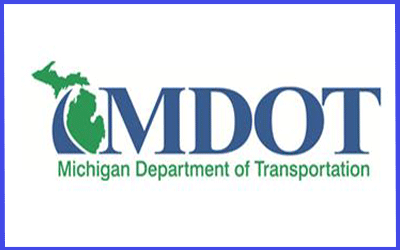
by orionontv | Mar 4, 2024 | Transportation
Transportation grant will support redevelopment efforts at
site of former Palace of Auburn Hills
LANSING, Mich. – Today, the Michigan Department of Transportation (MDOT) announced the award of a state Transportation Economic Development Fund (TEDF) grant that will support critical redevelopment efforts at the site of the former Palace of Auburn Hills with the potential to create up to 963 new jobs and spark $278 million private investment in the city of Auburn Hills.
Administered by MDOT, the TEDF grant helps finance public highway, road and street projects that are critical to the movement of people and products, and getting workers to their jobs, materials to growers and manufacturers, and finished goods to consumers. The road project submitted by the City of Auburn Hills will improve M-24 (Lapeer Road), which will increase investment and job creation at the former Palace of Auburn Hills site and support a General Motors (GM) facility.
“The City of Auburn Hills appreciates MDOT’s support to install roadway improvements that will facilitate proper traffic flow in and out of the new GM facility,” said Mayor Brian Marzolf. “This area of Lapeer Road serves as a critical thoroughfare and this cooperative project will also increase the safety in the area. Perhaps most exciting is that this new building will greatly enhance economic vitality as the new plant will serve the needs of the GM Orion Assembly plant and the future of electric vehicles. Road projects like this connect workers to jobs and provide important links for our communities.”
“We appreciate MDOT’s infrastructure grant for the new Auburn Hills supplier logistics center that will support GM’s Orion Assembly plant,” said Paris Pavlou, executive director of Global Purchasing and Manufacturing Services, General Motors. “The improvements that will result on Lapeer Road will benefit not only GM, but our suppliers and the community.”
Years after the demolition of the Palace of Auburn Hills, the dormant site will be re-imagined with a new development. This development is for a supplier facility to serve GM’s expansion at its Orion Assembly Plant. GM will be leasing the facility from the property developer, PAH Real Estate, a subsidiary of Schostak Brothers and Co. Piston Automotive will be operating the facility on behalf of GM, pending approval of additional state incentives.
Piston Automotive is a part of Piston Group, a company comprised of Piston Automotive, LLC; Piston Interiors, LLC; Detroit Thermal Systems, LLC; and A. Lava and Son, LLC. The group was founded by former NBA champion Vinnie Johnson. Piston Group is one of the largest private, minority-owned automotive suppliers in North America. It designs, engineers, assembles, and manufactures a wide variety of automotive parts and systems. This planned $278 million combined private investment from Piston Automotive and PAH Real Estate has the potential to create 963 jobs through the transformation of the site of the former Palace of Auburn Hills.
The site selection process prioritized the proximity to the Orion Township plant, the road infrastructure between and surrounding the two sites, the timeline for a site to be operational, and site specification requirements. To secure this investment, the City of Auburn Hills, MDOT, the Road Commission for Oakland County, and PAH Real Estate worked collaboratively to determine the infrastructure needs and find a solution.
“It has been great working with MDOT, the City of Auburn Hills, and GM on the TEDF grant. We are very excited to have been selected and we are looking forward to breaking ground on this electrifying project,” said Jeffrey Schostak, president of Schostak Brothers.
In its current state, access to the site is inadequate for the proposed use of generating more than 1,000 daily commercial vehicle trips and more than 2,000 daily passenger trips to and from the site, which could cause significant impacts on traffic in the area. Proposed improvements, such as widening the roadway of southbound M-24 to include additional through-lanes, right and left-turn lanes, reconfiguring crossovers between the northbound and southbound lanes, modernizing and relocating traffic signals, and increasing access to the I-75 connector ramp, were deemed necessary.
“For nearly three decades, The Palace of Auburn Hills served as an economic and entertainment hub not just for the city, but the region and entire state,” said state Sen. Jeremy Moss, D-Southfield. “I am excited to see these state funds help breathe new life into this memorable location, creating jobs and continuing to support our vital auto industry while also improving our roads and transportation needs for all.”
“I’m thrilled to help deliver on the promises we’ve made to put people first by creating opportunities for more jobs and to grow the local economy,” said state Rep. Brenda Carter, D-Pontiac. “This TEDF grant will help Auburn Hills develop over 900 new jobs and is expected to generate millions in private investments. The improvements on M-24 funded through this grant will bolster the infrastructure with a new highway and other road and street projects, allowing future redevelopment of the former Palace of Auburn Hills site. This new grant is great news for the hard-working people in my district, especially. This investment from the state is an example of the future of Michigan. We are investing in people and infrastructure. Michigan is ready for world-class opportunities that spark economic expansion and growth.”
Total project cost for these road improvements is $2,533,620. Category A of the TEDF will provide $2,007,820, with the remaining non-construction project costs, including 20 percent match of $525,800, provided by the City of Auburn Hills and PAH Real Estate.
Enacted in 1987 and reauthorized in 1993, TEDF “Category A” or “Targeted Industries Program” grants provide state funding for public roadway improvements that allow road agencies to respond quickly to the transportation needs of expanding companies and eliminate inadequate roadways as an obstacle to private investment and job creation. Eligible road agencies include MDOT, county road commissions, cities, and villages. More information about the program is available online at www.Michigan.gov/TEDF.
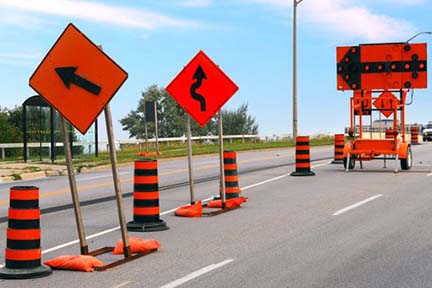
by orionontv | Feb 29, 2024 | Transportation
FOR IMMEDIATE RELEASE MEDIA CONTACT
February 28, 2024 Diane Cross
CrossD2@Michigan.gov
Traffic shift work begins tomorrow for I-75 project in northern Oakland County
VILLAGE OF CLARKSTON, Mich. – Bridge and road work continues along the I-75 project between M-15 (Ortonville Road) and the Oakland/Genesee county line, with crews working on resurfacing northbound I-75 from M-15 to the north Oakland County line. To prepare for the impending traffic shift scheduled during this resurfacing, there will be lane and ramp closures to install traffic control devices, pavement markings and the realignment of barrier walls.
Upcoming Closures:
Beginning 9 a.m. Thursday, Feb. 29, until late fall:
- Southbound I-75 will be reduced to two lanes from Baldwin Road (Genesse County line) to M-15.
Beginning 9 a.m. Friday, March 1, through 5 a.m. Monday, March 4:
- Southbound I-75 will be reduced to one lane for weekend work from Baldwin Road to M-15, along with intermittent ramp closures for pavement markings.
Beginning 9 a.m. Monday, March 4, through 7 p.m. Monday, March 18:
- Southbound I-75 will be reduced to one lane for barrier wall setting from Baldwin Road to M-15 to prepare for a traffic switch later in the month.
Beginning 5 a.m. Monday, March 4, through 9 p.m. Friday, Nov. 1:
- Southbound I-75 Exit 106 to Saginaw Road will be closed.
- The Saginaw Road entrance ramp to southbound I-75 (Mile Marker 106) will be closed.
Beginning 5 a.m. Monday, March 11, through 9 p.m. Friday, Nov. 1:
- The Dixie Highway entrance ramp to southbound I-75 (Mile Marker 93) will be closed.
This work is weather dependent, and if necessary, will be rescheduled to later weekend/s.
Beginning in mid-March (depending on weather) through late fall:
- Northbound and southbound I-75 will have two lanes open in each direction between M-15 and Baldwin Road with traffic shifted to the southbound I-75 side of the freeway.
- The following entrance ramps will be closed to northbound I-75:
- M-15 (Mile Marker 91)
- Dixie Highway (Mile Marker 93)
- East Holly Road (Mile Marker 98)
- Saginaw Road (Mile Marker 106)
- Only the northbound I-75 Exit 101 ramp to Grange Hall Road will be closed. All other exits on northbound I-75 will be open.
Funding for this project is made possible by Gov. Gretchen Whitmer’s Rebuilding Michigan program to rebuild the state highways and bridges that are critical to the state’s economy and carry the most traffic. The investment strategy is aimed at fixes that result in longer useful lives and improve the condition of the state’s infrastructure.
The Michigan Department of Transportation (MDOT) is investing approximately $160 million to resurface and repair I-75 from M-15 (Ortonville Road) to the Oakland/Genesee county line. This project includes resurfacing I-75, repairing 11 bridges, drainage improvements, culvert replacements, signs, and guardrail. Various work will be performed in different locations with different schedules throughout the 15 miles over four years.
Based on economic modeling, this investment is expected to directly and indirectly support 1,936 jobs.

by orionontv | Feb 26, 2024 | Transportation
MAC and MDOT announce award winners for
outstanding achievements in improving Michigan aviation
LANSING, Mich. – At the 2024 Michigan Airport Conference held in East Lansing on Feb. 22, the Michigan Aeronautics Commission (MAC) and Michigan Department of Transportation (MDOT) announced the award winners for achievements in promoting and improving aviation. These awards are presented to airports, professionals, consultants, and others. Here is a list of the 2024 award winners:
- General Aviation Airport of the Year Award The West Branch Community Airport in West Branch was selected for outstanding contribution and sustained excellence toward aviation progress and safety in Michigan. The airport demonstrated exemplary leadership and dedication in providing exceptional aviation services to the public.
- Air Carrier Airport of the Year Award The Alpena County Regional Airport in Alpena was recognized for sustained excellence and partnership toward aviation progress in Michigan. The airport is commended for their rebuilding of a runway critical to the airport’s operational efficiency and business continuity, which will meet the needs well into the future.
- Aviation Professional of the Year Award Gary Todd of the Clare Municipal Airport in Clare was recognized for his outstanding contribution and sustained excellence serving as the airport’s manager for the past decade. He showed exemplary leadership in maintaining the airport in top condition. Todd also collaborates with others in the aviation community to share his knowledge and provided flight training. His dedication and hard work contributed to aspirational standards for many aviation professionals.
- Aviation Community Involvement Award Casey Brown was selected for his outstanding contributions supporting the Lowell City Airport in Lowell. Brown volunteered at the airport, ensuring a safe, well-maintained facility, in addition to hosting special aviation events, which are recognized and appreciated by the public.
- Robert G. Pekham Consultant of the Year Award Arconcepts, an architectural, design and planning firm based in Livonia, was recognized for exceptional work on the Hillsdale Municipal Airport Terminal Project in Hillsdale. The firm’s team brought this project from sketch to reality in a very short timeline, ensuring all deadlines were met along the way. The newly designed terminal brings many modern amenities to the airport, creating a welcoming space for the public to enjoy. The building’s forward-thinking concept will meet the needs of next generation aviation enthusiasts for years to come.
- Aviation Student of the Year Award Willow MacLaughlin of Owosso was recognized for outstanding contributions as a Michigan aviation student. Passionate about aviation, she demonstrated it through volunteering with the Civil Air Patrol and restoring the Owosso Community Airport’s historic Beacon Memorial. In obtaining her private pilot license and studying to become a commercial airline pilot, MacLaughlin is a shining example of the high-caliber aviation professional the future aeronautics workforce can look forward to.
“Congratulations to this year’s awards winners and thank you for your contributions to improving Michigan aviation,” said Mike Trout, MAC director and MDOT Office of Aeronautics administrator. “Their outstanding work has not gone unnoticed to the MAC, MDOT and the aviation community.”
The MAC and MDOT have recognized airports, individuals and organizations whose innovative contributions have led to significant improvements to facilities, operations or public relations that support aviation in Michigan. The MAC is responsible for the general supervision of aeronautics within Michigan.
###
MDOT: Working with our partners at airports, bus systems, marine and rail to find innovative solutions for
Michigan’s transportation systems.
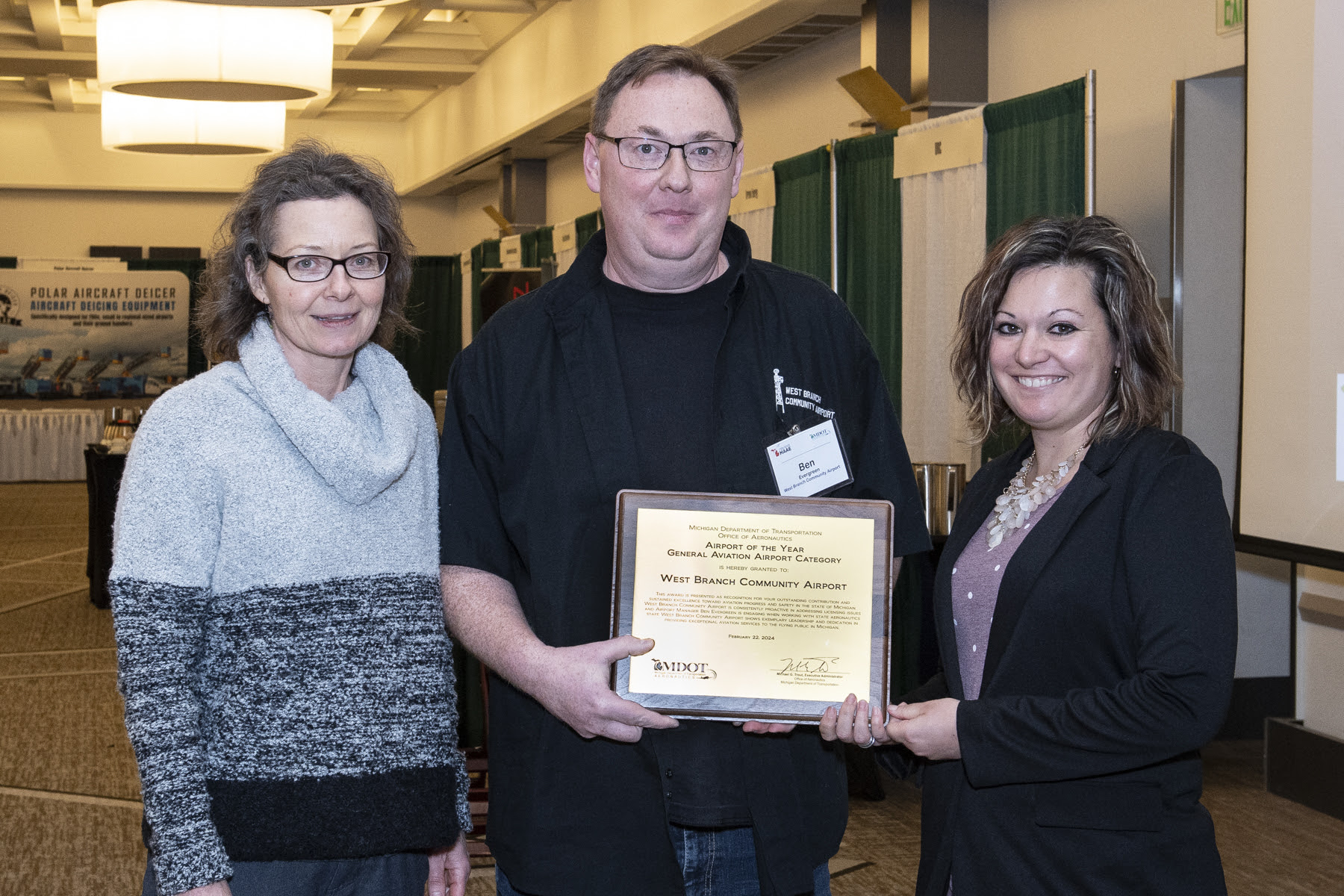
General Aviation Airport of the Year Award
Left to right: Betsy Steudle, MDOT Office of Aeronautics; Ben Evergreen, West Branch Community Airport; and Stephanie Whitinger, MDOT Office of Aeronautics.
© 2024 MDOT Photography Unit
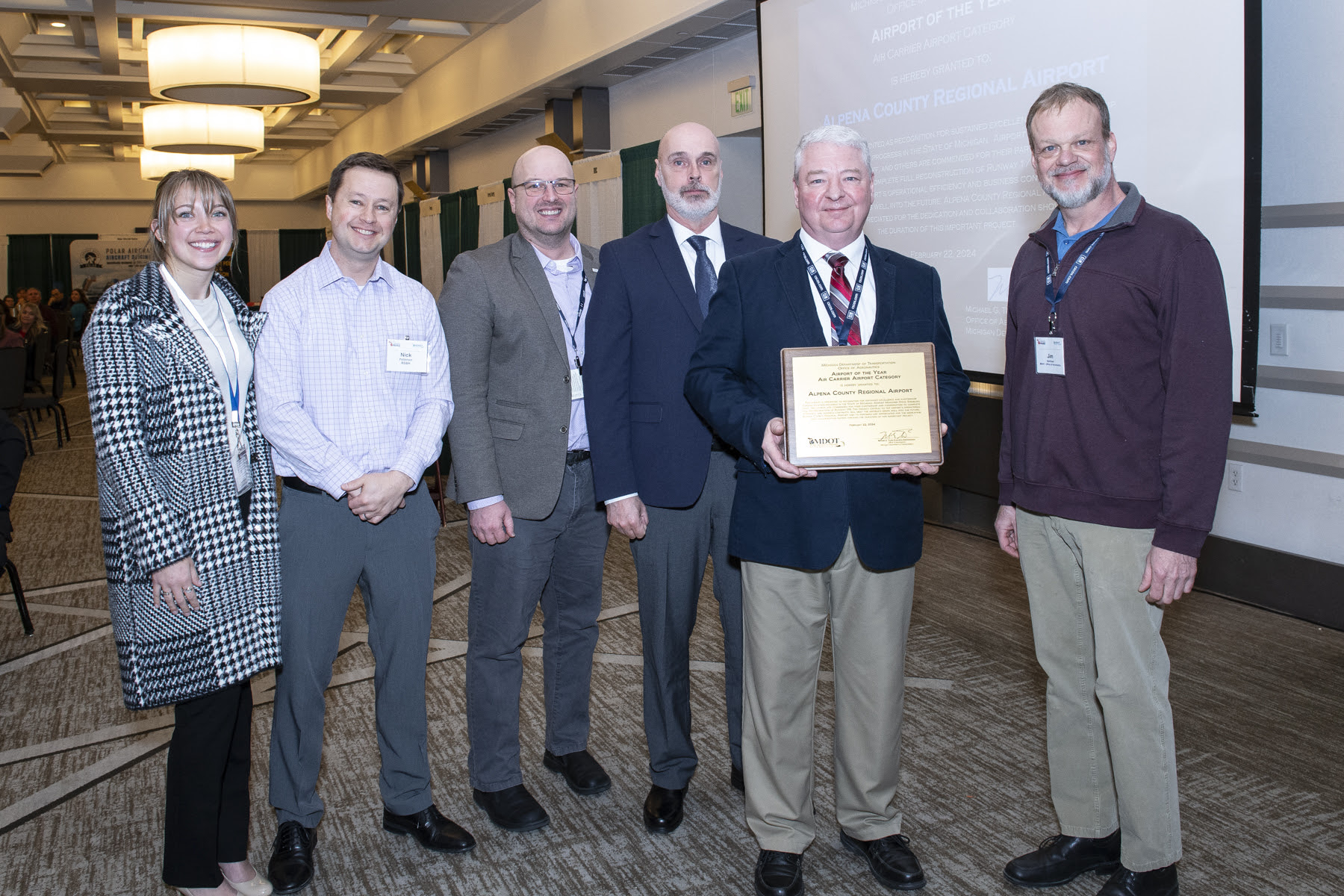
Air Carrier Airport of the Year Award
Left to right: Sarah Finello, Nick Patterson and David Joye, RS&H; John Kozlowski, chairman of the Alpena County Board of Commissioners; Steve Smigelsk (holding plaque), Alpena County Airport manager; and Jim Hartman, MDOT Office of Aeronautics.
© 2024 MDOT Photography Unit
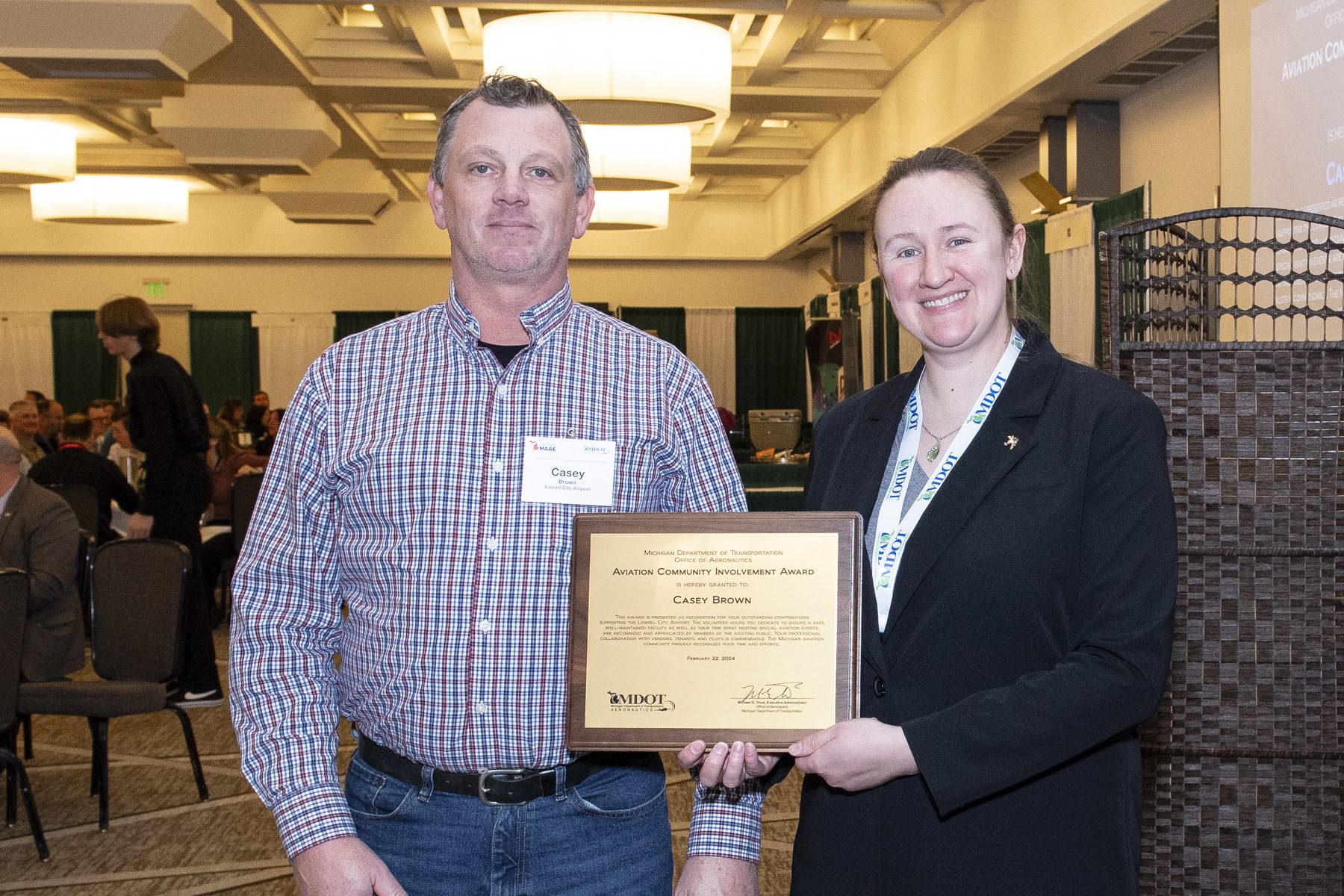
Aviation Community Involvement Award
Left to right: Casey Brown and Ashley Lucas, MDOT Office of Aeronautics.
© 2024 MDOT Photography Unit
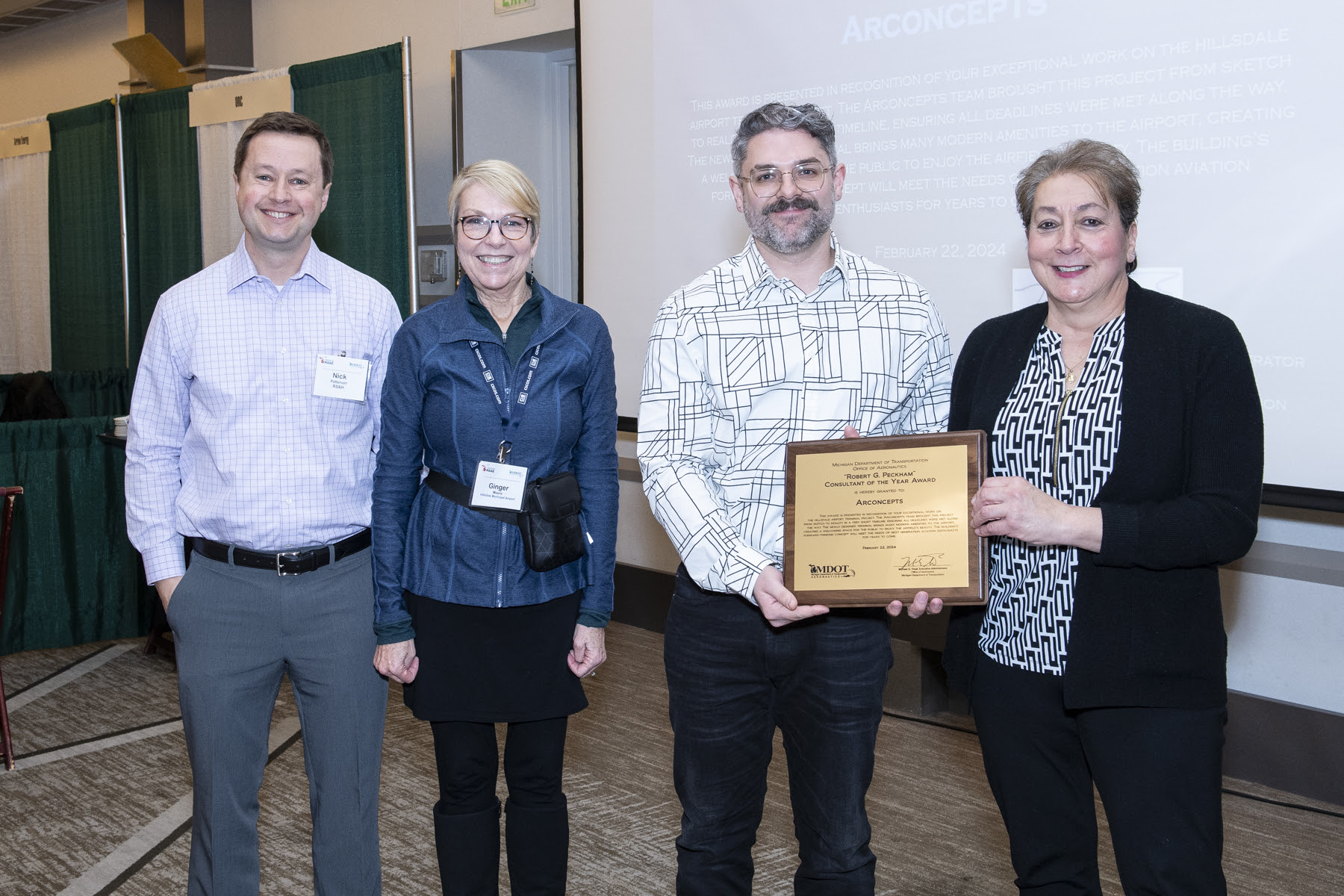
Robert G. Pekham Consultant of the Year Award
Left to right: Nick Patterson, RS&H; Ginger Moore, Hillsdale Municipal Airport; and Andrew Laszczyk and Shirley Ghannam, Arconcepts
© 2024 MDOT Photography Unit
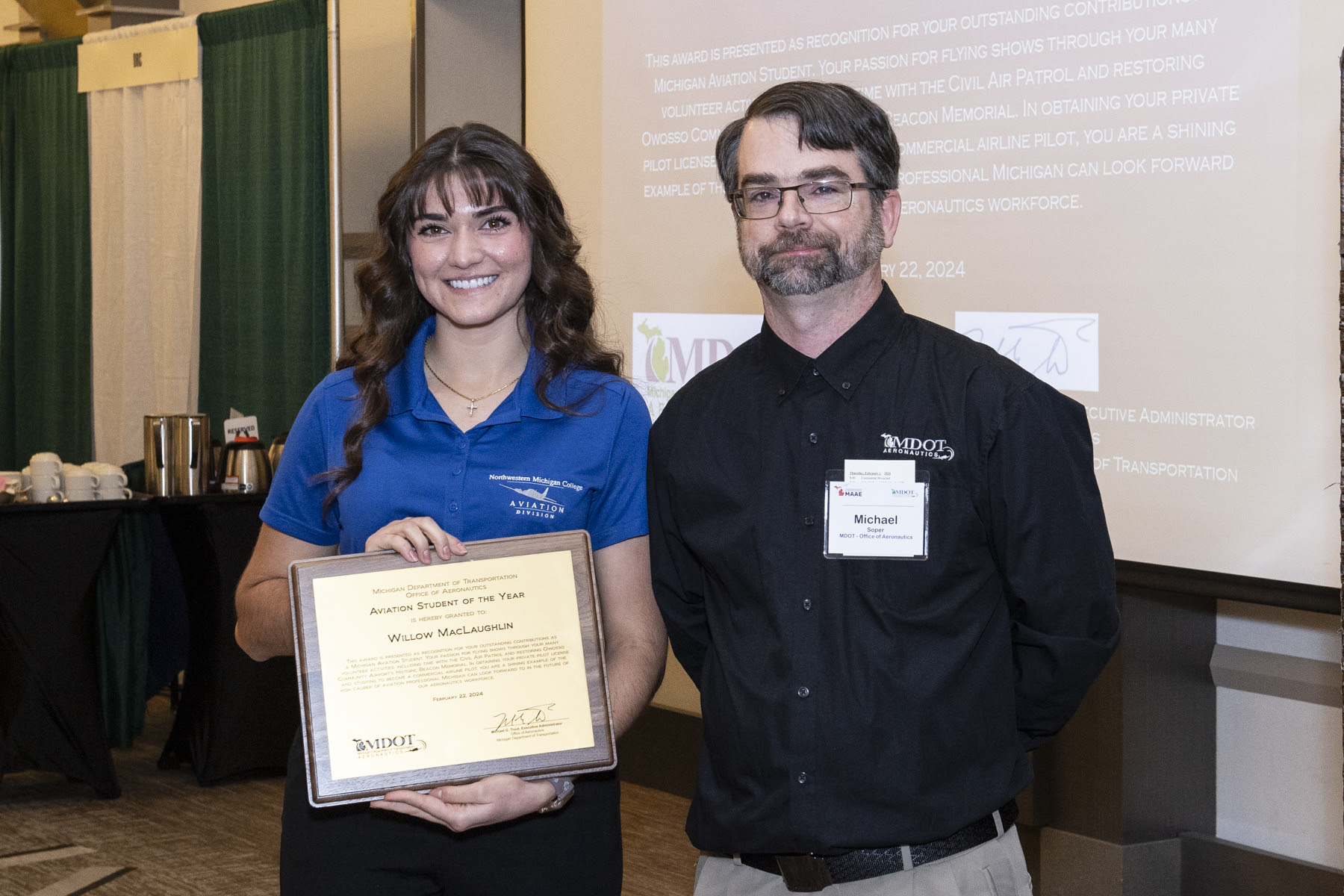
Aviation Student of the Year Award
Left to right: Willow MacLaughlin and Michael Soper, MDOT Office of Aeronautics.
© 2024 MDOT Photography Unit
Aviation Professional of the Year Award – Not Pictured

by orionontv | Feb 23, 2024 | Transportation
| Gov. Whitmer’s proposed budget includes more to enhance opportunity for all |
|
Gov. Whitmer’s proposed budget includes more to enhance opportunity for all
Michigan Gov. Gretchen Whitmer’s proposed Fiscal Year 2025 budget include additional funds for MI Contracting Opportunity, a program that supports contractors and suppliers who are socially or economically disadvantaged. The $5 million recommendation represents a renewal of the item in the previous budget, with a $2 million increase.
Listen now: https://www.buzzsprout.com/1374205/14555593-gov-whitmer-s-proposed-budget-includes-more-to-enhance-opportunity-for-all

On this week’s edition of the Talking Michigan Transportation podcast, Lisa Thompson, who directs the Michigan Department of Transportation’s (MDOT) Office of Business Development, which includes the Disadvantaged Business Enterprise (DBE) program, explains how the funding will help build on the success of assisting these businesses.
Thompson says the goal is to assist small businesses with tools to actively participate in the various phases of road and bridge design and construction.

Other objectives include:
- The continuation and growth of MDOT’s highly successful consultant, small business mentor-protégé program.
- Expanding a small business trucking program that covers the cost of commercial driver’s license (CDL) training for small, disadvantaged trucking companies to help with truck driver shortages.
- A key focus to connect firms with access to capital and the skills to manage it successfully throughout the project life cycle; build and maintain meaningful relationships with industry professionals to provide opportunities to utilize and/or expand their work types; and provide training regarding the intricacies of government contracting and ways to strengthen their business functions and efficiencies.
- Upcoming initiatives include creating two small business revolving loan programs to help support small, disadvantaged businesses grow and contract more MDOT work.There will be a small business lending program and a mega projects small business lending program. Any funds received by the state as repayment of past loans are appropriated and shall be available for future loans.
- Create a small business incubator program that serves MDOT’s existing small and disadvantaged business development program to grow the capacity of Michigan-based small, disadvantaged businesses through training and construction mentor-protégé opportunities.
|
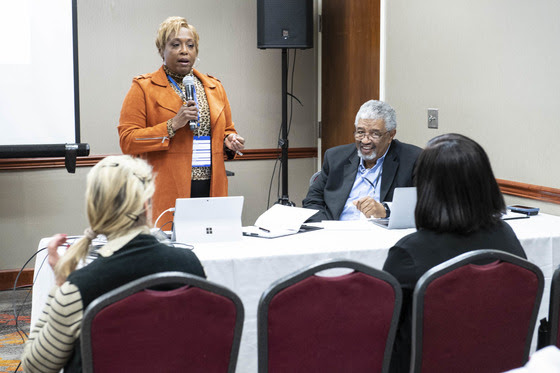
A guest presenter addresses the audience at the 2023 MDOT DBE Conference.
|
|
|
|

by orionontv | Feb 15, 2024 | Transportation
Gordie Howe International Bridge team continues to invest in communities
This week’s edition of the Talking Michigan Transportation podcast features conversations with two people who participated in a Feb. 6 announcement by the Windsor-Detroit Bridge Authority (WDBA) of an additional $2.6 million being invested in 13 community projects as part of construction of the Gordie Howe International Bridge (GHIB).
Listen now: https://www.buzzsprout.com/1374205/14512005-gordie-howe-international-bridge-team-continues-to-invest-in-communities


First, Heather Grondin, vice president of corporate affairs and external relations for WDBA, talks about the community benefits program and why it’s so important.
The projects include cycling infrastructure added to Jefferson Avenue and Clark Street, making for a connection between the GHIB multiuse path and the City of Detroit’s Joe Louis Greenway.
|
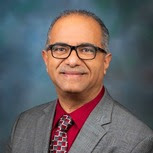
Later, Mohammed Alghurabi, a Michigan Department of Transportation (MDOT) senior project manager on the bridge project, talks about what it means to him to be able to demonstrate to residents that Canada and Michigan are delivering on promises to the community.
Projects announced for funding:
- $250,000 toward local history and culture,
- $1.3 million toward community safety,
- $540,000 toward green initiatives,
- $250,000 toward food security,
- $250,000 toward wellness, and
- $100,000 toward community partnerships.
|
|
|

by orionontv | Feb 6, 2024 | Transportation
FOR IMMEDIATE RELEASE MEDIA CONTACT
February 6, 2024 Diane Cross
CrossD2@Michigan.gov
Northbound I-75 resurfacing from M-15 (Ortonville Road) to Oakland/Genesee county line begins in early March
VILLAGE OF CLARKSTON, Mich. – Bridge and road work along I-75 in northern Oakland County is expected to resume in early March. The Michigan Department of Transportation is investing approximately $160 million to resurface and repair I-75 from M-15 (Ortonville Road) to the Oakland/Genesee county line. This project includes resurfacing I-75, repairing 11 bridges, drainage improvements, culvert replacements, signs, and guardrail. Various work will be performed in different locations with different schedules throughout the 15 miles over four years.
This year, northbound I-75 will be milled and resurfaced from M-15 to the county line, with two lanes of northbound and southbound traffic sharing the southbound side of the freeway. Bridge repairs will be performed throughout the project limits along northbound I-75. Work is expected to be completed for the year in late fall.
In 2025, milling and resurfacing will occur on southbound I-75 from the county line to M-15, with traffic sharing the northbound side. Then in 2026, crews will remove the temporary crossovers and perform the remaining miscellaneous activity.
Funding for this project is made possible by Gov. Gretchen Whitmer’s Rebuilding Michigan program to rebuild the state highways and bridges that are critical to the state’s economy and carry the most traffic. The investment strategy is aimed at fixes that result in longer useful lives and improve the condition of the state’s infrastructure.
Based on economic modeling, this investment is expected to directly and indirectly support 1,936 jobs.

















